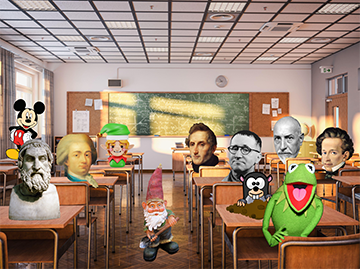Antonio Latella stages Pinocchio. Anything but a “children’s story”, his stage adaptation of Collodi’s work is centred around the theme of lies and the story of a nose which grows not only when the puppet lies but also when he is hungry...
Due to the themes examined and the language used in some scenes, the play is not suitable for spectators under the age of 14.
-
Teatro Strehler
Antonio Latella directs, for the first time, a play produced by the Piccolo. No easy short-cuts here, he puts his talent to the test with a universal figure which belongs to everyone and for which everyone has their own, almost exclusive, memory.
But this will be no fairy tale. And it’s not (only) for children. Latella places himself face to face with Pinocchio, looking for a view which is free of the 135 years of infinite interpretations deposited on Collodi’s character; trying to find, if it exists, that which until now has never been seen. «I don’t know which Pinocchio we will recount», admits Latella, stimulating his own artistic “curiosity”, and the expectations of everyone. But the starting point is certain: the lies of adults, of which Pinocchio was a most able apprentice.
We are used to thinking that the puppet Pinocchio sees his own nose get longer every time he tells a lie; this is what we have been taught and this is what we have learned to believe. And yet even this is a lie told by adults. Pinocchio’s nose, in Collodi’s tale, grows on various occasions, but not always when he lies.. At times it grows because he is alive... Hunger is also linked to the nose, because Geppetto saw fit to give his puppet a stomach. The nose permits Pinocchio to sense the breath of life in different ways from us... I think that Pinocchio belongs to everyone, both young and old, as every one of us has their own idea of Pinocchio, in as much as he corresponds to that which we ourselves are, or have been, or that which we would have wanted to be. It will be the artifice of theatre which will once again reveal us through its refined reworking of the truth.
Due to the themes examined and the language used in some scenes, the play is not suitable for spectators under the age of 14.
Duration: two hours and 50 minutes with interval
Learn more
Booklet
ReadAntonio Latella directs, for the first time, a play produced by the Piccolo. No easy short-cuts here, he puts his talent to the test with a universal figure which belongs to everyone and for which everyone has their own, almost exclusive, memory.
But this will be no fairy tale. And it’s not (only) for children. Latella places himself face to face with Pinocchio, looking for a view which is free of the 135 years of infinite interpretations deposited on Collodi’s character; trying to find, if it exists, that which until now has never been seen. «I don’t know which Pinocchio we will recount», admits Latella, stimulating his own artistic “curiosity”, and the expectations of everyone. But the starting point is certain: the lies of adults, of which Pinocchio was a most able apprentice.
We are used to thinking that the puppet Pinocchio sees his own nose get longer every time he tells a lie; this is what we have been taught and this is what we have learned to believe. And yet even this is a lie told by adults. Pinocchio’s nose, in Collodi’s tale, grows on various occasions, but not always when he lies.. At times it grows because he is alive... Hunger is also linked to the nose, because Geppetto saw fit to give his puppet a stomach. The nose permits Pinocchio to sense the breath of life in different ways from us... I think that Pinocchio belongs to everyone, both young and old, as every one of us has their own idea of Pinocchio, in as much as he corresponds to that which we ourselves are, or have been, or that which we would have wanted to be. It will be the artifice of theatre which will once again reveal us through its refined reworking of the truth.
Due to the themes examined and the language used in some scenes, the play is not suitable for spectators under the age of 14.
Duration: two hours and 50 minutes with interval
Learn more
Booklet
ReadMeetings and insights
Credits
Piccolo Teatro Strehler
from 19 January to 12 February 2017
Pinocchio
dramatisation by Antonio Latella, Federico Bellini, Linda Dalisi
directed by Antonio Latella
sets by Giuseppe Stellato
costumes by Graziella Pepe
music by Franco Visioli
lighting by Simone De Angelis
with Michele Andrei, Anna Coppola, Stefano Laguni. Christian La Rosa, Fabio Pasquini, Matteo Pennese, Marta Pizzigallo, Massimiliano Speziani
A Piccolo Teatro di Milano – Teatro d’Europa production
Information and bookings
Telephone service 02.42.41.48.89
From Monday to Saturday 9.45 a.m. – 6.45 p.m.
Sunday 10.00 a.m. – 5.00 p.m.
Teatro Strehler
From Monday to Saturday 9.45 a.m. to 6.45 p.m.
Sunday 1.00 p.m. to 6.30 p.m.
On the evening of the performance the sale of tickets will close one hour before the performance begins.
Groups and organisations
For information on tickets and subscriptions for groups and organisations, and afternoon performances for schools and educational shows, please contact the Servizio Promozione Pubblico e Proposte Culturali.
Tel.02.72.333.216
e-mail:promozione.pubblico@piccoloteatromilano.it























